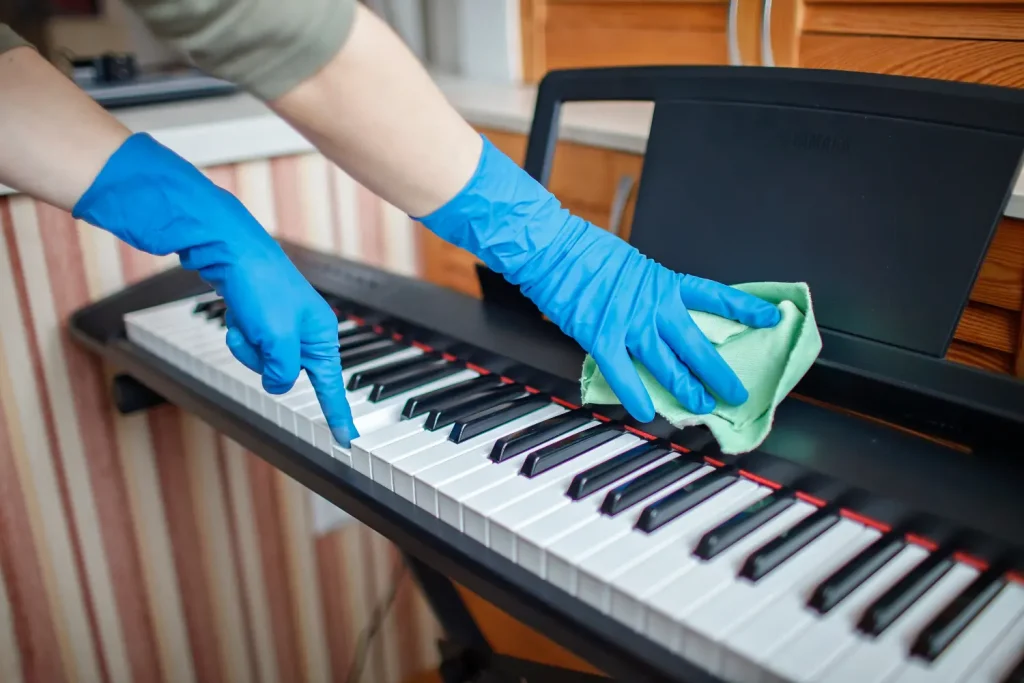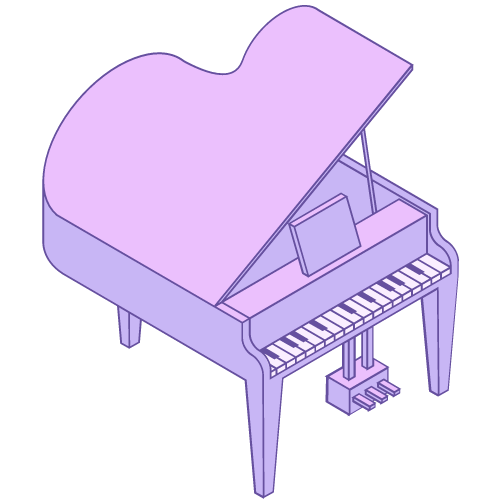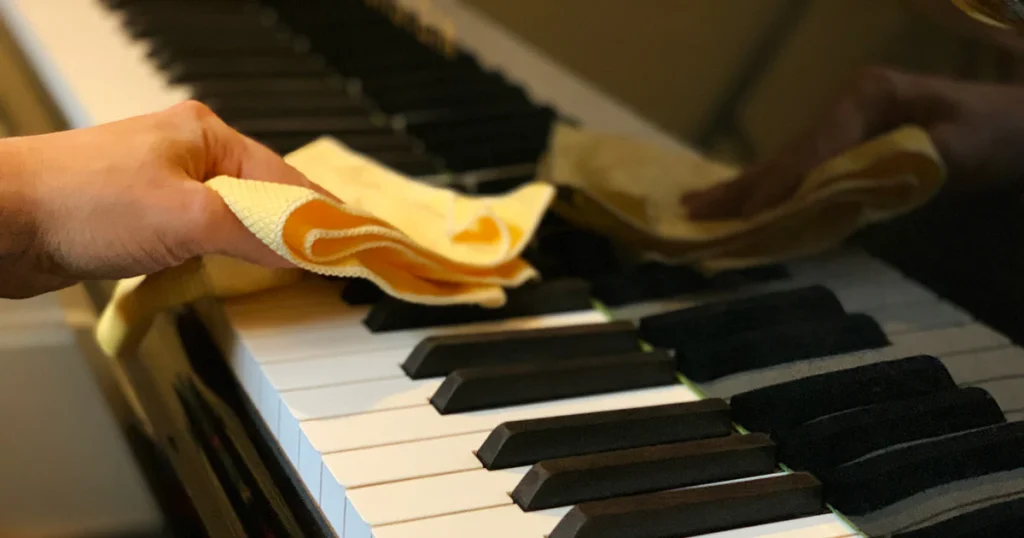Blog
How to Clean and Protect Your Piano from Damage
Pianos are among the most cherished and delicate musical instruments, and they require proper care to ensure they remain in excellent condition for years. Whether you own a grand piano, upright piano, or a digital piano, cleaning and protecting your instrument is essential for maintaining its sound, functionality, and aesthetic appeal.
In this guide, we’ll discuss how to clean and protect your piano from potential damage, helping you preserve its longevity and value. We’ll go over basic cleaning tips for both acoustic and digital pianos, as well as advice on protecting your piano from environmental damage and accidents.
1. Regular Cleaning for Acoustic Pianos
Acoustic pianos, whether grand or upright, are more susceptible to dust, dirt, and moisture, which can affect their appearance and performance. Here’s how to properly clean an acoustic piano:
Cleaning the Keys:
- Dusting: Use a soft, lint-free cloth or microfiber cloth to gently wipe the keys. Regular dusting will prevent dirt from accumulating and affecting the appearance of the piano.
- Deep Cleaning: For more stubborn dirt or sticky keys, slightly dampen the cloth with water, but make sure not to use too much moisture. Never pour water directly onto the keys or allow moisture to seep into the cracks between the keys.
- Avoid Chemicals: Do not use harsh chemicals or cleaning solutions on the keys, as these can damage the finish. For ivory keys, avoid using cleaners containing bleach or ammonia.

Cleaning the Exterior:
- Dusting: Use a soft, dry microfiber cloth to dust the exterior of your piano regularly. This will help prevent dirt and grime buildup.
- Wood Care: If your piano has a wooden finish, it’s important to use wood-specific cleaning products. Apply a small amount of furniture polish or wood cleaner onto a cloth, not directly on the wood. Buff the surface gently to avoid damaging the finish.
- Polishing: Periodically apply a polish specifically designed for pianos to restore its shine. Always check the manufacturer’s guidelines for recommended products. Over-polishing can create a buildup of residue, so avoid using excessive amounts.
Cleaning the Pedals:
- Dusting: Clean the pedals with a soft, damp cloth. Wipe them dry immediately to avoid moisture buildup.
- Polishing: If the pedals are metal, use a small amount of metal polish to maintain their shine and prevent rust. Be sure to wipe off any excess product, as it can damage the surrounding finish.
2. Cleaning and Maintaining Digital Pianos
While digital pianos don’t require tuning, they still need regular cleaning to maintain their functionality and appearance.
Cleaning the Keys:
- Dusting: Like acoustic pianos, use a microfiber cloth to dust the keys regularly. Digital pianos tend to attract more dust and fingerprints due to their glossy finish.
- Wiping: If the keys are particularly dirty, use a damp cloth to gently wipe them. Avoid soaking the keys or allowing any moisture to seep into the keyboard.
- Key Covers: For extra protection, you can use a keyboard cover when your digital piano is not in use to prevent dust and dirt buildup.
Cleaning the Exterior:
- Cloth Cleaning: Wipe the body of the digital piano with a soft, dry cloth. Be cautious around the display screen and buttons. If needed, you can slightly dampen the cloth with water, but make sure not to get any moisture inside the ports or connections.
- Display Screen: Use a screen wipe or a soft microfiber cloth to clean the digital piano’s screen, avoiding harsh chemicals. Never spray anything directly onto the screen.
Cleaning the Pedals:
- Dusting: Use a damp cloth to clean the pedals, ensuring you don’t get moisture in the electronics. Dry the pedals immediately to prevent rust.
- Polishing: If the pedals are metal, apply a small amount of metal polish to restore shine and remove any tarnish. Be sure to wipe away any excess polish.
3. Protecting Your Piano from Environmental Damage
The environment in which your piano is kept plays a significant role in its longevity. Temperature fluctuations, humidity levels, and exposure to sunlight can all cause damage to your instrument. Here are some steps you can take to protect your piano from these environmental factors:
1. Temperature and Humidity Control
Pianos are made of wood, felt, and metal, which can all be affected by temperature and humidity fluctuations. Here’s how to manage these conditions:
- Ideal Temperature: Pianos should be kept in a room with a consistent temperature between 68°F and 72°F (20°C – 22°C). Avoid placing the piano near heaters, air conditioners, or radiators, as these can cause extreme fluctuations in temperature and humidity.
- Humidity Control: Ideally, the humidity in the room should be between 40% and 60%. Too much humidity can cause the wood to swell, and too little can cause it to crack. Invest in a humidifier during dry months and a dehumidifier in humid conditions. Some pianos also come with built-in humidity control systems, such as the Dampp-Chaser, which can help regulate internal humidity levels.
2. Keep Your Piano Away from Direct Sunlight
Prolonged exposure to direct sunlight can cause the finish on your piano to fade or become discolored. It can also cause the wood to dry out, leading to cracking and warping. To protect your piano:
- Move the Piano: Keep your piano away from windows and direct sunlight. If your piano is near a window, consider using blinds or curtains to block the sun.
- Use a Cover: If you cannot move the piano, consider using a protective cover to shield it from sunlight when not in use.
3. Use a Piano Cover
A piano cover is a simple and effective way to protect your instrument from dust, dirt, pet hair, and accidental spills. A fitted cover will protect both the keys and the exterior of your piano. For digital pianos, a cover can also protect the screen and buttons from dirt and fingerprints.
- For Acoustic Pianos: Choose a breathable fabric cover to avoid moisture buildup under the cover.
- For Digital Pianos: Opt for a dustproof cover that’s easy to remove and clean.
4. Regular Inspections and Professional Care
Regular professional inspections are essential for maintaining the long-term health of your piano. Whether you own a digital or acoustic piano, it’s important to have a qualified technician inspect the instrument once or twice a year.
- Acoustic Pianos: Regular tuning is necessary, and a professional technician will also check the action, hammers, pedals, and overall condition of the piano. They can help identify potential problems before they become major issues.
- Digital Pianos: While digital pianos don’t require tuning, it’s still advisable to have them checked for software updates and any mechanical issues, such as worn-out keys or pedals.
5. Protecting from Accidental Damage
Accidental damage can be one of the quickest ways to ruin the appearance or functionality of your piano. Here are a few tips to prevent accidents:

For Acoustic Pianos:
- Avoid Heavy Items on Top: Never place heavy objects, such as books, vases, or lamps, on top of your piano. These items can damage the finish or, in extreme cases, cause structural damage.
- Keep Pets and Children Away: Pets can scratch the finish or get hair on the piano, while children may accidentally hit the keys or pull at the pedals.
- Piano Bench Care: Ensure the piano bench is properly maintained and doesn’t get scratched or damaged. A soft cushion can also be placed on the bench for extra protection.
For Digital Pianos:
- Keyboard Covers: Use a keyboard cover to protect the keys from dust and spills.
- Safe Storage: When not in use, store your digital piano in a safe, dry place. If you travel with it, always use a padded case or protective bag.
Conclusion: Keep Your Piano Safe and Sound
Proper cleaning and protection are essential for maintaining your piano’s sound, appearance, and longevity. Whether you have an acoustic or digital piano, taking the time to care for your instrument can help preserve its value and performance for years to come.
By regularly cleaning the keys and exterior, controlling the environment around the piano, and protecting it from environmental damage and accidents, you’ll be able to enjoy your instrument for many years. Always consult the manufacturer’s guidelines for specific care recommendations and consider professional maintenance to ensure that your piano remains in top condition.
With the right care and protection, your piano will continue to bring beautiful music into your life for decades!


